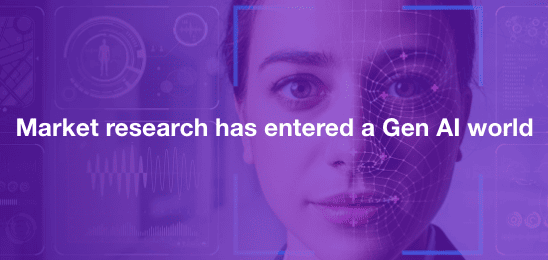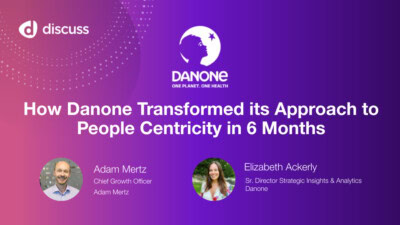Part 3: Generative AI – Market Research Angel or Devil? How to ensure you win in this new era

By Adam Mertz, Chief Growth Officer at Discuss
In part one of this blog series I spent time reviewing the promise for the potential of generative AI, and then in part two I focused on security-related questions and focus areas for using generative AI to ensure compliance to global privacy regulations. This blog post will focus on how GenAI is pioneering a new era in market research and even will likely change how market research resources are allocated between quant and qual.
Revolutionizing Market Research Methodologies
For decades, market researchers have strived to unlock the mysteries of consumer behavior and preferences. We understand that great strategies are built on a foundation of deep audience understanding—a principle that remains as relevant today as it did in the past. However, the landscape of market research is rapidly evolving, driven by advancements in technology and shifting consumer behaviors.
GenAI represents a pivotal moment in the history of market research. It’s not merely a technological advancement; it’s a catalyst for change—a seismic shift that has been decades in the making. For too long, market researchers have relied heavily on quantitative methods to gather data and insights. Surveys, polls, and structured data analysis have been the go-to tools for understanding consumer behavior and preferences. However, the limitations and vulnerabilities of traditional quantitative research methods have become increasingly apparent in recent years.
In this industry webcast, Lenny Murphy from Greenbook shared a troubling revelation: in a quantitative survey, out of 2,700 responses, 600 had to be discarded due to suspicions of inauthenticity. These responses, flagged as potentially generated by AI, underscored a fundamental challenge facing quantitative research methodologies—the risk of manipulation or fabrication. This revelation serves as a wake-up call for market researchers everywhere. We can no longer afford to blindly trust quantitative data without considering its potential limitations and vulnerabilities.
Balancing Speed, Quality, and Cost-Effectiveness in a GenAI Era
The rise of GenAI marks a fundamental shift in how we approach market research. No longer confined to rigid survey structures and predefined questions, GenAI enables researchers to extract nuanced insights from unstructured data sources with unprecedented speed and accuracy. By leveraging natural language processing algorithms, GenAI can analyze vast amounts of textual data, uncovering hidden patterns and trends that were previously inaccessible through traditional methods.
Traditionally, market research budgets have been heavily weighted towards quantitative methods. Surveys, polls, and structured data analysis have been the go-to tools for gathering insights quickly and efficiently. However, as the limitations of quantitative research become increasingly apparent, companies need to shift their mindset and reevaluate their priorities, strategies, and budget allocations.
Companies must recognize the value of qualitative research methods, which offer a deeper understanding of consumer motivations, preferences, and behaviors. Generative AI plays a crucial role in this transition, enabling researchers to extract nuanced insights from unstructured data sources and engage with consumers in more meaningful ways.

At Discuss, we recognize the need to embrace this shift towards qualitative agility. We understand that great strategies are built around having a deep understanding of target audiences, and that means moving beyond the constraints of traditional methods and embracing new technologies that enable deeper, more authentic insights. This means reallocating resources towards qualitative research, investing in tools and technologies that facilitate real-time engagement with consumers, and prioritizing authenticity and depth of insight over sheer quantity of data.
But the shift goes beyond just the adoption of new technologies—it’s also about rethinking our approach to market research as a whole. It’s about recognizing that faster, better, and cheaper are not mutually exclusive—that true innovation lies in finding the delicate balance between speed, quality, and cost-effectiveness.
Embracing the Human Centricity Revolution
With the advent of generative AI, qualitative research has become more accessible and scalable than ever before. Unlike quantitative methods, which often rely on structured surveys and predefined questions, qualitative research is inherently more exploratory and open-ended. It’s about understanding the “why” behind consumer behavior, delving deep into their motivations, aspirations, and pain points.
Before GenAI, conducting qualitative research was often a complex and time-consuming process. It required skilled moderators, extensive data analysis, and often involved language and cultural barriers, particularly in global markets. However, with the advent of GenAI, these barriers are rapidly diminishing. Researchers can now conduct focus groups, interviews, and other qualitative research activities with unprecedented speed and efficiency, transcending geographical boundaries and language barriers with ease.
Imagine being able to conduct focus groups in multiple languages, across different time zones, with ease. Imagine being able to extract key themes and insights from unstructured data sources with the click of a button, without the need for manual analysis. This is the promise of generative AI—a promise that is already reshaping the landscape of market research.
Integrating GenAI Into Market Research Practices
Innovative organizations like Edgewell Personal Care have fully embraced the potential of GenAI to revolutionize their market research practices. Check out this video to learn how Edgewell Personal Care is getting deeper consumer insights with the latest GenAI-based qualitative research tools.
Positioning for Future Success
As market research leaders, it’s our responsibility to lead the charge towards qualitative agility—to embrace new technologies, rethink our methodologies, and prioritize depth of insight above all else. By understanding and embracing the seismic shift brought about by GenAI, market research leaders can position their companies for long-term success.
In looking towards the future, it’s clear that the role of generative AI in market research will only continue to grow. With technologies like OpenAI’s Sora on the horizon, the possibilities are truly endless. From effortlessly creating stimulus for research to generating professional-grade highlight reels for stakeholders, the potential applications of generative AI are limited only by our imagination.
At Discuss, we’re committed to staying at the forefront of this evolution. We were the first mover in our space to bring generative AI to qualitative research, and we’re constantly innovating to anticipate and adapt to what’s coming next. Because for us, the journey is just beginning—we’re not done out-innovating ever.
It’s undeniable that market research has entered a GenAI world. It’s reshaping the way we gather insights, allocate budgets, and ultimately, make strategic decisions. By embracing this shift and harnessing the power of generative AI, we can unlock a world of possibilities by driving next gen insights.
Discover How to Utilize GenAI to Scale Global Human Centricity

Tuesday, April 30th, 2024 | 12:20pm – 12:40pm EST
With the amount of change that’s transpired in the last 3 years, cracking the code on changing consumer behaviors and perceptions has never been more critical.
Join Sioned Winfield, Senior Director of Global Insights & Marketing Capabilities at PepsiCo, along with Adam Mertz, Chief Growth Officer at Discuss, to hear about the new approach and technologies PepsiCo is leveraging to enable human voices to be seamlessly integrated into their processes.
About Adam Mertz –
Adam is responsible for leading the innovation, go-to-market, and growth strategies for Discuss. His past 2+ years with Discuss have been focused on driving a culture of obsessing over customer challenges in market research, and innovation that enables customers to rethink what’s possible in scaling qual research. Adam frequently speaks on the new era market research is now in. Recently, he has moderated a thought leader panel on the use of generative AI in in market research, How to Change the Game With Generative AI in Market Research, which featured Rowan Curran, Forrester analyst focused on generative AI, Robin Lindberg, Principal at Quadrant Strategies, Liz White, SVP of Research and Strategy at Buzzback; as well as presenting at TMRE’s 2024 annual conference with Sai Pisipati, Consumer Insights and Analytics Manager at Reckitt, Scaling Global Empathy – What’s Worked and How Gen AI Changes the Game.
Ready to unlock human-centric market insights?
Related Articles

What Is Vibe Coding for Market Insights? And Why It Matters for Modern Marketers
By Adam Mertz, Chief Growth Officer at Discuss Let’s be honest. Most marketers don’t wake up thinking, “I need to…
By Adam Mertz, Chief Growth Officer at Discuss Let’s be honest. Most marketers don’t wake up thinking, “I need to…

When to Use Human-Led vs AI-Led Interviews for In-Depth Customer Feedback
AI is everywhere right now. It’s in your inbox. It’s on your social media. It’s taking notes in your meetings. …
AI is everywhere right now. It’s in your inbox. It’s on your social media. It’s taking notes in your meetings. …

6 Ways AI Agents are Redefining Global Human Understanding
Shatter surface-level thinking and build true human understanding with AI Agents We’re overwhelmed by data—but starved for connection. In an…
Shatter surface-level thinking and build true human understanding with AI Agents We’re overwhelmed by data—but starved for connection. In an…



